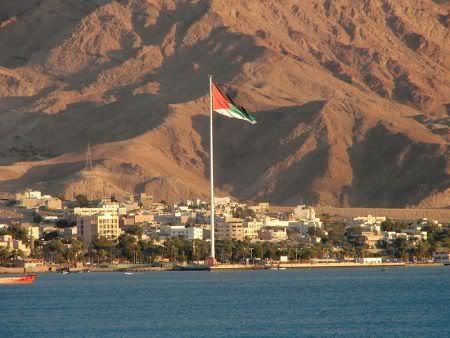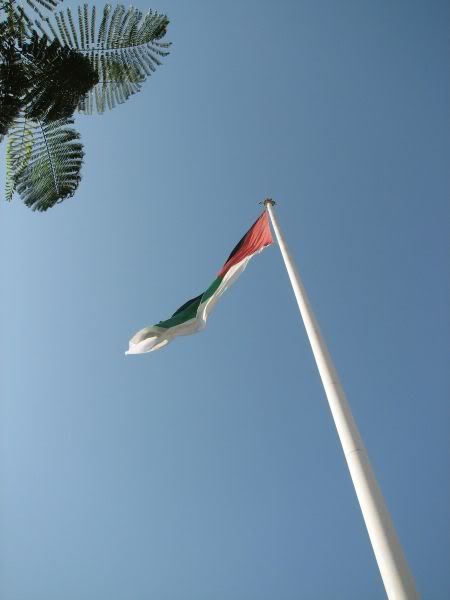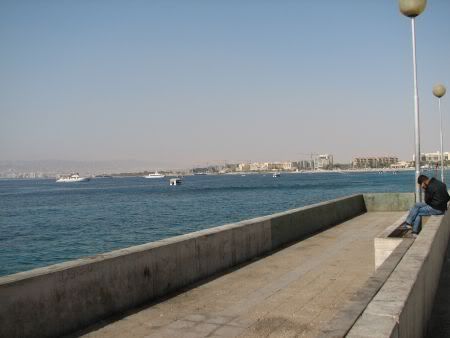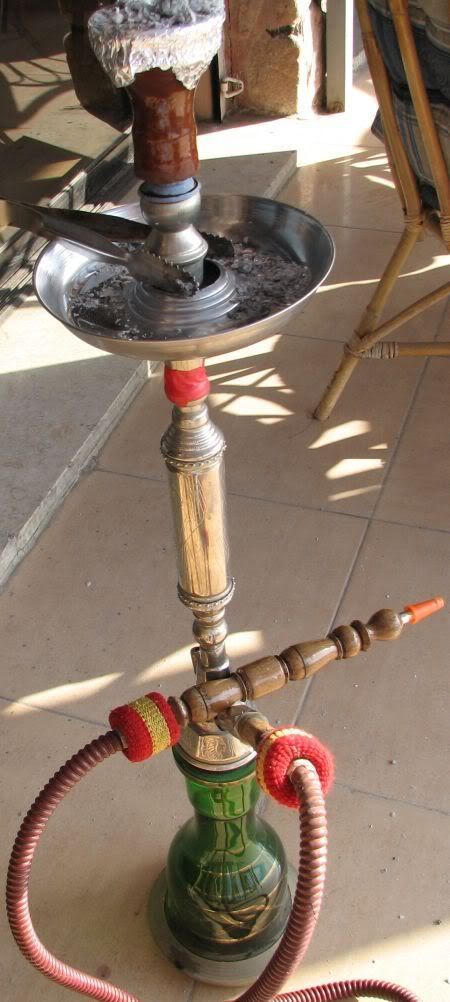Saturday Jordan photoblogging on Sunday

yesterday - saturday - was the second day of the weekend here in aqaba, jordan... today, the u.s. project office where i work is closed to observe martin luther king day, so i get a three-day weekend (not like i'm not working anyway!)...
yesterday, however, i took a stroll down the public beach area along the gulf of aqaba... it was full of families enjoying a january day that almost bordered on hot... the beach area is lined with palm-thatched and canvas-covered canopies where food vendors offer tables, chairs, snacks, tea and shishas (water pipes) in the shade where the parents can relax while the kids frolic in the water and chase each other across the sand... paralleling the beach on a walkway are souk (bazaar) vendors peddling beach accessories, trinkets, souvenirs, collections of kids clothes, shoes, sandals, postcards - all the usual items such folks try to foist on visitors seeking water, sun and sand...
i walked all the way down to the enormous flagpole that flys the jumbo-sized flag of the arab revolt (not the same as the official flag of jordan, see above and below) that can be seen literally all over town... there were lots of families and kids there too and the kids were pestering their parents to let them have a turn on one of those small electric kiddie cars available for rent... following that, i adjourned to a nearby cafe where i plopped in a comfortable rattan chair on the terrace and took my ease while smoking a shisha and drinking turkish coffee... not a bad afternoon overall...

Flag of the Arab Revolt as seen from the Gulf of Aqaba
(courtesy of Wikipedia)
The Aqaba Flagpole in Aqaba, Jordan is the second tallest free standing flagpole in the world at a height of 132 meters (430 feet) high. It carries the flag of the Arab Revolt and can be seen from Israel, Egypt, and Saudi Arabia.
here's the photo i took yesterday from the plaza that surrounds the flag base...

aqaba is in the midst of a development boom which may or may not survive the current global financial meltdown... anyway, below is a photo i took from the waterfront near the flag looking back toward the hotel area, and the photo below that is an enlarged section where, if you can pick them out, you can see 7 construction cranes, all serving the construction sites of 7 different new hotels... (in the far center left of the larger photo, you can see the buildings of eilat, israel...)


Aqaba (Arabic: العقبة, Al-ʻAqabah) is a coastal town in the far south of Jordan. It is the capital of Aqaba Governorate. Aqaba is strategically important to Jordan as it is the country's only seaport. The town borders Eilat, Israel, and there is a border post where it is possible to cross between the two countries (see Wadi Araba Crossing). Both Aqaba and Eilat are at the head of the Gulf of Aqaba.
[...]
During World War I, the occupying Ottoman forces were forced to withdraw from the town after a raid led by T. E. Lawrence and the Arab forces of Sharif Hussein in 1917, making the territory part of the Kingdom of Hejaz, under the rule of Prince Faisal. The capture of Aqaba helped open supply lines from Egypt up to Arab and British forces afield further north in Transjordan and Greater Palestine, and more importantly alleviated a threat of a Turkish offensive onto the strategically important Suez Canal.
[...]
Aqaba has been chosen for the sight of a new waterfront building project that would rebuild Aqaba with new man-made water structures, new high-rise residential and office buildings, and more tourist services to place Aqaba on the investment map and challenge other centers of waterfront development throughout the region.
[...]
Aqaba's economy is skyrocketing because of the economic zone. New resorts are being constructed, but most are still on its leveling stage. New projects like Tala Bay and Saraya al Aqaba are well under construction which will provide high-end vacation and residential homes to locals and foreigners alike.
Along with tourism projects, Aqaba has also attracted global logistic companies such as APM Terminals and Agility to invest in logistics, which boosted the city's status as a transport and logistics hub.
There are numerous hotels that reside in Aqaba but new hotels are also under construction.
finally, here's a photo of one of life's little pleasures, the shisha, something i was introduced to last year in afghanistan... finally i understand why you always see photos of tea and coffee shops with men sitting around smoking water pipes... it's a great way to pass the time, engage in conversation, drink coffee and tea and solve the world's problems...

Depending on locality and supply, hookahs may be referred to by many names, often of Arabic, Indian, Turkic, or Persian origin. Narghilè is the name most commonly used in the Palestinian Territories, Lebanon, Syria, Iraq, Jordan, Greece, Turkey, Azerbaijan, Armenia, Bulgaria and Israel, although the initial "n" is often dropped in Arabic pronunciation. Narghile derives from the Persian word nārgil (نارگیل), meaning coconut, which in turn is from the Sanskrit word nārikela (नारिकेला), suggesting that early hookahs were hewn from coconut shells.[7]
In Albania, Bosnia, Croatia the hookah is called "Lula" or "Lulava" in Romani, meaning "pipe," the word "shishe" refers to the actual bottle piece.
Shisha (Arabic: شيشة), from the Persian word shīshe (شیشه), meaning glass, is the common term for the hookah in Egypt and the Arab countries of the Persian Gulf (including Kuwait, Iraq, Bahrain, Qatar, Oman, UAE, and Saudi Arabia), and in Indonesia, Morocco, Pakistan, Tunisia, Somalia and Yemen.
for those of you tempted to think i was engaged in smoking substances other than tobacco, you can put your minds at ease...!
Labels: Aqaba, Ara, Jordan, Lawrence of Arabia, photoblogging, shisha
Submit To PropellerTweet














